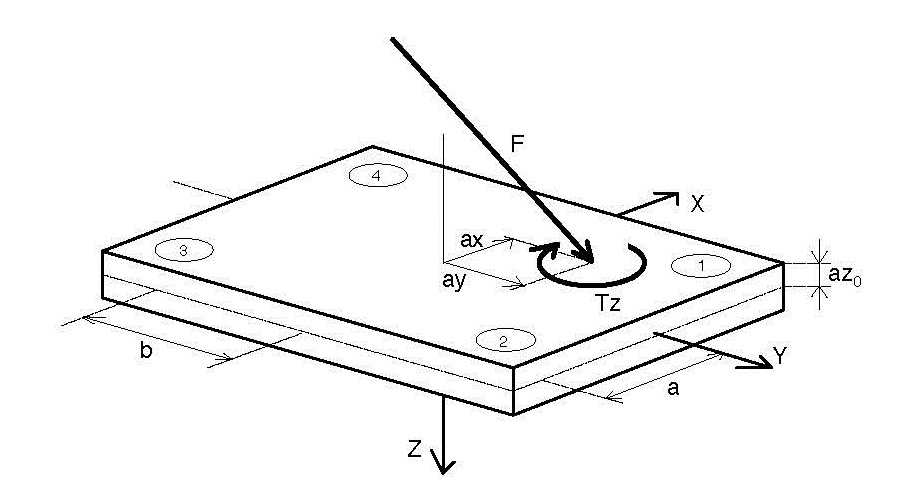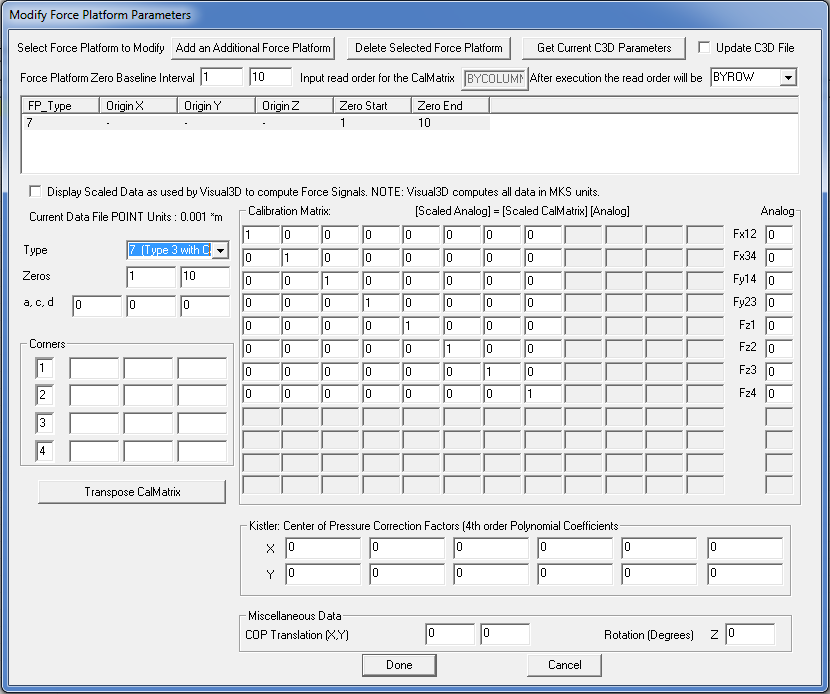Table of Contents
FP Type 8
The difference between and Type 3 and a Type 7 is that a Type 7 includes a CalMatrix. See FP_Type_3
C3D Parameters
The following parameters should exist:
FP_USED= number of force platforms used FP_TYPE= 3 FP_ZERO= the range of frames for which a background noise level is calculated and then subtracted from each of the analog channels FP_CHANNELS= Fx12, Fx34, Fy14, Fy23, Fz1, Fz2, Fz3, Fz4 FP_ORIGIN= The origin of the force platform in the force platform coordinate system (see the force platform manufacturer specifications. FP_CORNERS= The (x,y,z) coordinates of the force platform corners in the laboratory coordinate system. Note that there is a specific ordering of the four corners. FP_CALMATRIX= 8 x 8 Calibration Matrix. (Type 7 only)
Compute Force, COP, and FreeMoment
C3D Origin
a= Origin.X b= Origin.Y az0= Origin.Z
C3D Parameter FORCE_PLATFORM:ORIGIN
The ORIGIN is a vector comprised of the following components.
- x= half the distance between the sensors along the force platform x-axis
- y= half the distance between the sensors along the force platform y-axis
- z= distance from the sensor coordinate system to the top surface of the force platform surface. This value should be negative
Guessing the correct FORCE_PLATFORM::ORIGIN
FP_ORIGIN= The origin of the force platform in the force platform coordinate system (see the force platform manufacturer specifications). The C3D file format is a public document (http://www.c3d.org) that most hardware vendors currently export. We are only aware of one implementation of the format that has an inconsistency that Visual3D must handle explicitly.
The FORCE_PLATFORM:ORIGIN parameter (within the PARAMETER SECTION of the C3D file) describes the location of the working surface of the force platform relative to the force platform coordinate system. For AMTI force platforms the z-value of the origin should be a negative value. Visual3D can correct this value automatically should it read a positive value.
Should the user not want to have the program correct this value automatically, a dialog is available under the Properties menu item labeled “Use correct FORCE_PLATFORM:ORIGIN vector”. In this dialog the user can select the check box “Perform automatic correction”(the default).
C3D Channels
[Original Analog]= [Fx12, Fx34, Fy14, Fy23, Fz1, Fz2, Fz3, Fz4] as specified by the ANALOG channel numbers
Compute Baselines
Average the Analog signals for the specified C3D ZERO frames
Subtract Baselines
[Tared Analog]= [Original Analog]-[Baseline]
Processed Analogs
If Processed Analog signals are used [Tared Analog]= [Processed Analog]-[Baseline]
Pre-Multiply by the CalMatrix
[Analog]= [Fx12, Fx34, Fy14, Fy23, Fz1, Fz2, Fz3, Fz4]= [CalMatrix][Tared Analog] This applies only for the Type 7. You might also think of the type 3 platform as having a CalMatrix equal to the Identity matrix. For a type 7 force platform the edit boxes shown must be filled in.
The CalMatrix and ORIGIN parameters are provided in the Kistler manual. Each force platform has different values.
Compute Force Vector
Force.X = Fx12+Fx34 Force.Y = Fy14+Fy23 Force.Z = Fz1+Fz2+Fz3+Fz4
Compute Center of Pressure
M.X = b*( Fz1 + Fz2 - Fz3 - Fz4) - az0*(Fy14 + Fy23) M.Y = a*(-Fz1 + Fz2 + Fz3 - Fz4) + az0*(Fx12 + Fx34) M.Z = b*(-Fx12 + Fx34) + a*(Fy14 + Fy23) COP.X = ((az0*Force.X - M.Y)/Force.Z) + a COP.Y = ((M.X + az0*Force.Y)/Force.Z) + b COP.Z = az0
Compute Free Moment
FreeMoment.X = 0 FreeMoment.Y = 0 FreeMoment.Z = M.Z - (COP.X-a)*Force.Y + (COP.Y-b)*Force.X
Force Threshold
if (|Force,Z| < Force_Min) Force.X.= 0 Force.Y.= 0 Force.Z.= 0 COP.X = NO_DATA COP.Y = NO_DATA COP.Z = NO_DATA FreeMoment.X = 0 FreeMoment.Y = 0 FreeMoment.Z = 0
Transform Forces
These resulting signals are computed in the force platform coordinate system, and must be transformed into the laboratory coordinate system for use in Visual3D.


